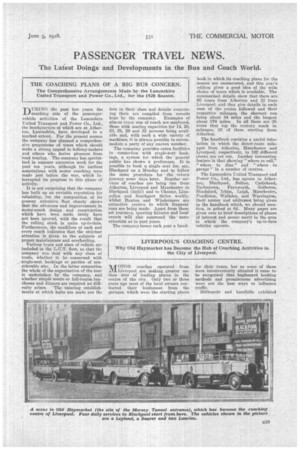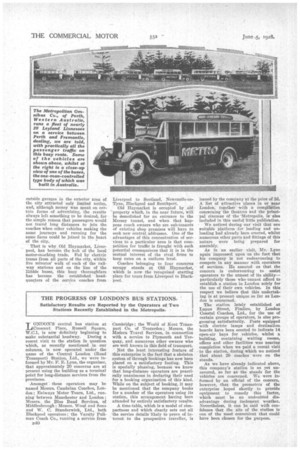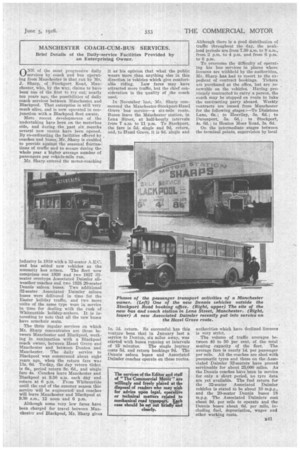PASSENGER TRAVEL NEWS.
Page 65

Page 66

Page 67

If you've noticed an error in this article please click here to report it so we can fix it.
The Latest Doings and Developments in the Bus and Coach World.
DURI:NG the past few years the coaching side of the passengervehicle activities of the Lancashire United Transport and Power Co., Ltd., the headquarters of which are at Atherton, Lancashire, have developed to a marked extent. For the present season the company has. planned a comprehensive programme of tours which should make a strong appeal to holiday-makers and others who derive pleasure from road touring,. The company has specialized in summer excursion work for the past ten years, although its earliest associations with motor coaching were made just before the war, which interrupted its progress in this phase of activity.
It is not surprising that the company has built up an enviable reputation for reliability, for the composition of its present extensive fleet clearly shows that the advances and improvements in motor-coach design and construction which have been', made lately have not been ignored, with the result that the rolling stock is quite up-to-date. Furthermore, the condition of each and every coach indicates that the strictest attention is given to the subjects of proper maintenance' and overhauling.
'Various types and sizes of vehicle are Included in the L.U.T. fleet, so that the company can deal -with any class of trade, whether it be concerned with single-seat bookings or parties of considerable size. In. the latter connection the whole of the organization of the tour is undertaken by the company, and whether simple meals or full-course luncheons and dinners are required no diffi culty arises. The catering establishments at which halts are made are the beat in their class and details concerning them are compiled from records kept by the company. Examples of almost every size of coach are employed, those with seating capacities for 14, 20, 23, 2S, 29 and 32 persons being available and, with such a wide variety of machines, it is always possible to accommodate a party of any uneven number.
The company provides extra facilities in connection with single-seat bookings, a system for which the general public has shown a preference. It is possible to book a single seat for, say, Blackpool on a Monday and to follow the same procedure for • the return journey some days later. Regular services of coaches are being run from Atherton, Liverpool and Manchester to Blackpool (daily) and to Chester, Llangollen and Southport thrice weekly, whilst Buxton and Windermere are attractive centres to which frequent runs are being made. Apart from these set journeys, sporting fixtures and local events will also command the same attention as in past years.
The company issues each year a hand
/ OTOR coaches operated from ,,.Y.LLiverpool are making greater use than ever of loading places in the Centre of the city. Only two or three years ago most of the local owners conducted their businesses from the garages, which were the starting places book in which its coaching plans for the season are enumerated, and this year's edition gives a good idea of the wide choice of tours which is available. The summarized details show that there are 66 tours from Atherton and :12 from Liverpool, and they give details in each ease of the routes followed and their respective mileages, the shortest run being about 34 miles and the longest about 176 miles. In all there are 35 , tours that top the century mark in mileages, 25 of them starting from Atherton.
The handbook contains a useful tabulation in which the direct-route mileages from Atherton, Manchester and Liverpool, respectively, to 102 different places are set out. Another interesting feature is that showing " where to call," 'where to dine " and "where to garage" n a number of centres.
The Lancashire United Transport and Power Co., Ltd., has agents in Atherton, Blackpool, Bolton, Cadishead, Earlestown, Farnwortb, Golborne, Hindsford, Main, Leigh, Manchester, Pendleton, Walkden, and Warrington, their names and addresses being given in the handbook which, we should mention, is priced at 6d. Many pages are given over to brief descriptions of places of interest and scenic merit in the area in which the company's up-to-data vehicles operate.
for their tours, but as some of these were inconveniently situated it came to be recognized that haphazard booking methods and promiscuous advertising were not the best ways to influence traffic.
Billboards and handbills exhibited
outside garages in the exterior area of the city attracted only limited notice, and, although money was spent on certain forms of advertising, the results always left something to be desired, for the simple reason that passengers would not travel long distances . to join the coaches when other vehicles making the same journeys and running for the same fares could be joined in the heart of the city.
That is why. Old Haymarket, Liverpool, has become the hub of the local motor-coaching trade. Fed by electric trams from all parts of the city, within five minutes' walk of each of the railway stations and on the line of the Ribble buses, this busy thoroughfare has become the established headQuarters of the service coaches from LONDON'S central bus station at Crescent Place, Russell Square, W.C.L is now definitely beginning to make substantial headway. During a recent visit to the station in question which, as recently mentioned in our columns, is now operated under the name of the Central London (Road Transport) Station, Ltd., we were informed by Mr. F. E. Lyne, the organizer, that approximately 20 concerns are at present using the building as a terminal point for long-distance services from the provinces.
Amongst these operators may be named Messrs. Cambrian Coaches, London; Eniways Motor Tours, Ltd., running between Manchester and London; Messrs. the Blue Band Services, of Middlesbrough; Messrs. Wood and Sons and W. C. Standerwick, Ltd., both Blackpool operators ; the Varsity Pullman Coach Co., running a service from B40 Liverpool to Scotland, Newcastle-onTyne, Blackpool and Southport.
Old Haymarket is occupied by .old 'property which, in the near future, will be demolished for an entrance to the Mersey tunnel, and when that happens coach owners who are sub-tenants of existing shop premises will have to seek new central addresses. One of the advantages of this concentration of services to a particular area is that competition for traffic is fraught with such potential consequences that it is in the mutual interest of the rival firms to keep rates on a uniform level.
Coaches belonging to four concerns occupy stands at Old Haymarket, which is now the recognized starting place for tours from Liverpool to Blackpool.
Cambridge ; the Weald of Kent Transport Co. of Tenterden; Messrs. the Modern Travel Services, in connection with a service to Plymouth and Torquay, and numerous other owners who are well known in this field of transport.
Not the least interesting feature of this enterprise is the fact that a skeleton system of through bookings has now been placed on a satisfactory footing. This is specially pleasing, because we know that long-distance operators are practit cally unanimous in declaring their need for a booking organization of this kind. While on the subject of booking, it may be mentioned that the company books for a number of the operators using its station, this arrangement having been attended by entirely satisfactory results.
A time-table, which is a model of compactness and which clearly sets out all the service details likely to prove of interest to the prospective traveller, is
issued by the company at the price of 2d. A list of attractive pIacei in or near London, togetherWith a 'compilation concerning the theatres and the principal cinemas of the 'Metropolis, is also included in this 'tts'eftil little publication.
• We noticed during Or visit that one suitable platform flit' loading and unloading had already been erected, whilst nutherous other parts find fittings of this nature were being prepared for assembly. • • As in an earlier visit, Mr. Lyne again impressed upon us the fact that his company is not endeavouring to compete in any manner with operators of services. He assured us that the concern is endeavouring to assist operators to the utmost of its ability— particularly those who cannot afford to establish a station in London solely for the use of their own. vehicles. In this respect we believe that this undertaking is at present unique so far as London is concerned.
The station lately established at Lupus Street, Pimlico, by London Coastal Coaches, Ltd., for the use of certain groups of operators, is also progressing satisfactorily. Posts equipped with electric lamps and destination boards have been erected to indicate 14 open-air bays for vehicles, whilst a building, containing waiting rooms, offices and other facilities was nearing completion when we paid a recent visit to the station, during which we noticed that about 20 coaches were on the stands.
As we have already indicated above, this company's station is as yet uncovered, so far as the stands for the vehicles are concerned. We were informed by an official of the concern, however, that the promoters of the enterprise hoped shortly to provide equipment to remedy this factor, which must be an undoubted disadvantage during inclement weather. Nevertheless, it can be said with confidence that the site of the station is One of the most convenient that could
have been chosen for the purpose. •
ONE of the most progressive daily services by coach and bus operating from Manchester is that run by Mr. J. Sharp, of • Stockport Road, Manchester, who, by the way, claims to have been one of the first to try out, nearly ten years ago, the possibilities of daily coach services between Manchester and Blackpool. That enterprise is still very much alive, and is now operated itt conjunction with a Blackpool fleet owner.
More recent .developments of the Undertaking have been on the motorbus side, and during. the past six months several new routes have been opened. By co-ordinating the facilities offered by coaches and buses, Mr. Sharp is enabled to provide against the seasonal finetnations of traffic and.to secure during the whole year a higher average number of passengers per vehicle-mile rim.
Mr. Sharp entered the motor-coaching Industry in 1919 with a 32-seater A.V.C. and has added new vehicles as the necessity has arisen. The fleet now comprises one 1926 and two 1927 32seater overtype Associated Daimler allweather coaches and two 1928 20-seater Dennis saloon buses. Two additional 32-seater. Associated Daimler saloon buses were delivered in time for the Easter holiday traffic, and two more units of the same type were in service in time for dealing with the rush of Whitsuntide holiday-makers. It is interesting to note that all the new buses have armchair seats.
The three regular services on which Mr. Sharp concentrates are those between Manchester and Blackpool, working in conjunction with a Blackpool coach owner, between Hazel Grove and Manchester and between Denton and Manchester. The daily service to Blackpool was commenced about eight years ago, when the return fare was 13s. 6d. To-day, the day return ticket is 6s., period return 8.1. 6d„ and single fare 4s. Coaches leave Manchester and Blackpool at 9.30 a.m. each day and return at 6 p.m. From Whitsuntide until the end of the summer season this service will be augmented and coaches will leave Manchester and Blackpool at 9.30 a.m., 12 noon and 6 p.m.
Although some very low fares have been charged for travel between Manchester and Blackpool, Mr. 'Sharp gives it as his opinion that what the public wants more ,than anything else in this direction is Vehicles which give comfortable riding. Low fares may have attracted more traffie, loit the chief consideration is the quality of the coach used.
in November last, Mr. Sharp commenced the Manchester-Stockport-Hazel Grove bus service—a six-mile route. Buses leave the Manchester station, in Lena Street, at half-hourly intervals from 7 am. to 11 p.m. To Stockport, the fare is 5d. single and 9d. return, and, to Hazel Grove, it is 8d. Single and
is. 3d. return. So successful has this venture been that in January last a service to Denton, six miles away, was started with buses running at intervals
of 15 minutes. The single journey costs 5d, and return bookings 9d. The Dennis saloon buses and Associated Daimler coaches operate on these routes.
Although there is a good distribution of traffic throughout the day, the peakload periods are from 7.30 a.m. to 9 from 2 p.m. to 4 p.m. and from 6 p.m. to 8 p.m.
To overcome the difficulty of operating his bus services in places where licences are withheld by the authorities, Mr. Sharp has had to resort to the expedient of contract bookings. Tickets are purchased at the office, but are renewable on the vehicles. Raving previously contracted to carry a person, the coach may be stopped en route to take the contracting party aboard. Weekly contracts are issued from Manchester for the following stages :—To Dialstone Lane, 6s.; to lleaviley, 5s. 6d.; to Davenport, Sc. (Id,; to Stockport, 45. 6d.; to Heaton Moor Road, 3s. 6d.
On the intermediate stages between the terminal points, supervision by local authorities which have declined licences is very strict.
The volume of traffic averages between 40 to 50 Per cent, of the total seating capacity of the fleet, The average fare is nearly 1d. per passenger per mile. All the coaches are shod with pneumatic tyres and those on the Associated Daimler 32-seaters have proved serviceable for about 25,000 miles. As the Dennis coaches have been in service for only a short period, no tyre data are yet available. The fuel return for the 32-seater Associated Daimler vehicles is stated to be about 10 m.p.g., and the 20-seater Dennis buses 18 m.p.g. The Associated Dain3lers cost about 9d. per mile to operate and the Dennis buses about 6d. per mile, including fuel, depreciation, wages and other working costs.




















































































































